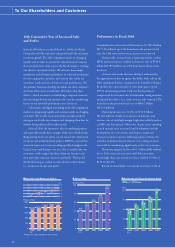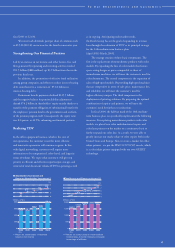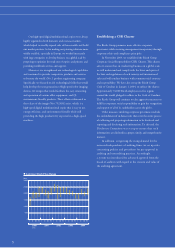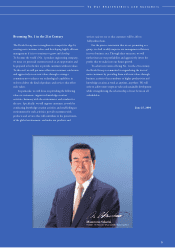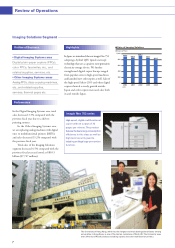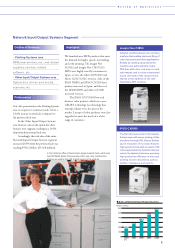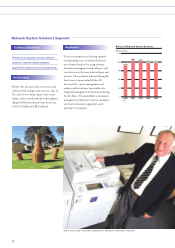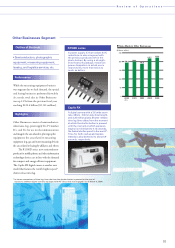Ricoh 2004 Annual Report Download - page 14
Download and view the complete annual report
Please find page 14 of the 2004 Ricoh annual report below. You can navigate through the pages in the report by either clicking on the pages listed below, or by using the keyword search tool below to find specific information within the annual report.
1313
Corporate Social Responsibility
Corporate Philosophy/Management Philosophy/Ricoh General Principles on the Environment
Ricoh’s management philosophy was formally
introduced in 1986 based on the Company’s
corporate philosophy in order to establish and
nurture the corporate culture and system so that
survival in a time filled with increasing change,
information-oriented societies, diverse values, and
more intense competition could be ensured.
Love your neighbor
Love your country
Love your work
–The Spirit of Three Loves–
Our Purpose
To constantly create new value
for the world at the interface of people
and information
Our Goal
To be a good global corporate citizen
with reliability and appeal
Corporate Philosophy
The Ricoh Group’s corporate philosophy was
established by its founder,
Kiyoshi Ichimura. He explained the philosophy as
follows: Everyone starts by loving himself/herself. As
time passes, however, this feeling grows and
expands to include all people, plants, and animals in
the world. This philosophy drives the Ricoh Group
toward better sustainable management.
Management Philosophy
Ricoh introduced the Ricoh General Principles on the
Environment, which are based on its management
philosophy, in 1992 and revised them in 1998. These
principles show Ricoh’s commitment to sustainable
management and are widely disclosed to the public
through various media, including websites. Based
on these principles, Ricoh Group companies have
independently established and managed their own
rules regarding the environment according to their
business type.
Based on our management principles, we recognize environmental
conservation as one of the most important missions given to
mankind, and we regard environmental conservation as an
integral element in all our business activities. We, therefore,
assume responsibility for environmental conservation and
approach this on a companywide basis.
1. Not only do we comply with all domestic and overseas
environmental regulations, but we also set our own targets to
reduce stress on the environment in consideration of social
expectations, and we endeavor to attain our targets.
2. We strive to promote technological innovation while at the
same time maintaining and improving our environmental
conservation systems.
3. In development, design and operation of factory facilities, we
always consider their impact on the environment, and we
strive to prevent pollution, to utilize energy and resources
effectively, and to reduce and dispose of waste products in a
responsible manner.
4. At every stage, from planning, development, design, procure-
ment and production to sales, logistics, use, recycling and
disposal, we offer products and services which have minimal
environmental impact and give maximum consideration to
safety.
5. Through environmental education, we strive to raise awareness
of all our employees in order to develop a social viewpoint
that enables them to conduct environmental activities under
their own responsibility.
6. In every country and region where we conduct our business,
we maintain close ties with the local communities and we
contribute to society by publicizing our activities and
assisting environmental conservation activities.
Basic Policy
Action Guideline
Ricoh General Principles on the Environment
Our Principles
To think as an entrepreneur
To put ourselves in the other
person’s place
To find personal value in our work


